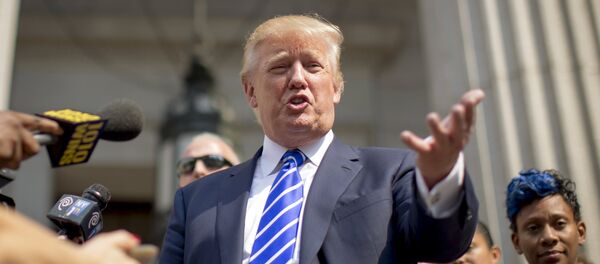As corporate America is eyeing a looming return to money-making from the staggering redistribution of wealth in the past eight years, there are, however, certain economic implications both in the US and overseas stemming from Trump's ambitious fiscal endeavor. The idea behind Trump's tax reform is quite simple at first glance: lower the taxes at home and hike protectionist customs tariffs (or border tax), resulting in tax relief for US businesses, while multinational enterprises would make up for the loss of US budget revenues with their money.
"[We are] lowering the overall tax burden of American businesses, big league," Trump said. "We're going to be announcing something I would say over the two or three weeks that will be phenomenal in terms of tax."
No further details have been announced thus far, yet the markets responded with an explicit anticipation of greater business confidence, piling up cash in equity and commodities: oil prices are going up should Trump cut the taxes on a "big league" scale.
"The outlook for the US is quite positive and that's pretty good for the US and for equity markets globally," Michael Bell of JPMorgan Asset Management said in his Bloomberg TV interview on Friday. "Imagine you get a corporate tax cut down to around 20pc compared with the average of about 35pc at the moment, that has a hugely positive impact on earnings."
Indeed, higher earnings expectations, aside of making corporate investors happy, will also push business investment and reinvestment higher, which is particularly important after years of dismal private-sector capital allocation in the means of production. That means higher energy prices – specifically so, as OPEC is surprisingly delivering on its production cap agreements.
Meanwhile, analysts from Goldman Sachs said the protectionist customs tariffs, yet to be announced by Trump, would dramatically reshape the global energy trade.
"The decline in US LNG (liquefied natural gas) export prices post-tax credit would drive global LNG demand higher, in our view, reversing the loss of volumes that the greater decline in coal vs. foreign LNG costs had initially created," Damien Courvalin of Goldman said in the note. "On our estimate, this would leave global LNG demand unchanged pre- and post- a border tax adjustment."
Whilst the US companies will seek to increase their energy exports, resulting in higher domestic fuel prices, the acceleration in US inflation and higher base interest rates will push the US economic growth higher. At the same time, international energy producers will seek to capitalise on trade deals the Trump administration would likely put on the table, so they could get access to the US energy consumers: America will still have to import energy, and restricting access to its domestic market will make it a desired prise in the perception on international producers.
This is why energy stocks rallied on Trump's tax announcement despite the allegations international oil prices might tumble due to America's protectionism. As the economic growth is poised to gain momentum, private sector enterprises across most market segments are eyeing greater revenues. Yet, there might be some deviations from this basic layout when Trump gets to his tax reform in practice, meaning it is rather hard to predict how it will eventually play out.




